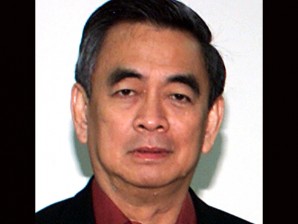Isagani “Gani” M. Yambot Sr. always carried jokes in his pocket, but he will be best remembered for his advocacy of journalists’ rights, gentleness with reporters and his practice of good journalism.
That was how the late Philippine Daily Inquirer publisher was remembered by seasoned journalists who had pounded the beat with him, edited the same newspaper and worked with him in newsrooms as they paid tribute to him on “media night” Tuesday at Arlington Memorial Chapels in Quezon City.
Yambot, 77, died on Friday, 10 days after he had a quadruple heart bypass operation in Medical City.
Luis V. Teodoro, a journalism professor, saw in Yambot a “man of constant good humor” who was nearly “always ready with a joke that was more often than not of his own making.”
“When Gloria Macapagal-Arroyo’s husband included him among the 46 journalists she sued for libel in 2006, Gani said he had so many suits he felt as if he were the best-dressed journalist in Manila,” Teodoro said.
He said he suspected that Yambot either originated or was one of the originators of the “bad habit” joke, “the one that says that some journalists are forced to do things they don’t really want to do because their children have developed the bad habit of eating.”
Media insights
More than his humor, Teodoro said Yambot imparted insights at the Jaime Ongpin Seminar and Awards for Excellence in Journalism, as well as symposiums, round-table discussions and other events organized by the Center for Media Freedom and Responsibility and the University of the Philippines’ College of Mass Communication (UPCMC).
Teodoro recalled that during martial law, Yambot would often visit the UPCMC to “candidly discuss with students the true state of the media.”
He said Yambot always accepted invitations to serve as speaker, trainer or resource person at the College Editors Guild’s seminars and workshops.
“In the last two years since the Ampatuan massacre, he also attended and often spoke at marches and demonstrations demanding justice for the victims of that atrocity,” he said.
In the forums where ethics and professional standards were the topics, Teodoro said Yambot “was constant in his opposition to spin and to editorializing in the news pages, believing that the news is meant to provide information and that opinion is best left to the op-ed pages.”
“It’s tempting to say that his perspective puts him in the old school category, but the truth is that his perspective is neither old nor new, just good journalism,” he said.
Old buddies
Teodoro said: “Gani Yambot’s benign presence, his jokes and his insights we will all miss, as his presence, I am sure, will be missed in the Inquirer newsroom. Beyond that, however, his example should remind us all that while our common destiny is to leave this world whether early or late, the people and the community we serve will remember us with fondness and appreciation only if we do journalism the justice it deserves by being as upright and as moral, as decent and as honorable, as Gani was.”
Former Press Secretary Rod Reyes related that he and Yambot had gone a long way, having studied at Torres High School in Tondo, Manila, (Yambot was his senior) and having worked at the same paper, the Manila Times.
Reyes said he had always “looked up” to Yambot. Even though he became editor of Manila Times while Yambot stayed on as a reporter covering the Senate, he had always thought of him as a “better craftsman.”
When they faced each other off in press forums at the height of the advertising boycott called by then President Joseph Estrada against the Inquirer in 2000, Reyes, who was then press secretary, said Yambot “had always been civil.”
BizNews Asia publisher Tony Lopez cracked jokes while paying tribute to Yambot, whose gentleness he well remembered.
“The job of a publisher is a ‘killer’ job, but I’m not saying the Inquirer killed Gani,” he said, drawing chuckles from the crowd in the packed chapel of the funeral house on Araneta Avenue.
Lopez said the “well-known fact” about Yambot was that he was the “best-dressed” newspaperman “because he had many suits—libel suits that is.”
“Gani was always gentle and mild-mannered unlike so many editors and publishers like me who often yell at subordinates. He was gentle and a true gentleman,” he said.
Ermin Garcia and Jake Macasaet of the Philippine Press Institute, former senator and radio host Richard Gordon, former newspaperman Satur Ocampo, Johnny Dayang of the Publishers Association of the Philippines, Danilo Arao of the UPCMC and Nonoy Espina of the National Union of Journalists of the Philippines were also among those who heaped praises on Yambot.
Christian Monsod and his wife, Solita, also paid their respects.
Cebu press council
In Cebu City, the Cebu Citizens-Press Council (CCPC) joined other media organizations in mourning the death of Yambot, saying he was genuinely concerned about the community press.
“As trustee and later chair of the Philippine Press Institute (PPI), he initiated and supported training programs aimed at improving the craft and values of community journalists,” Pachico Seares, CCPC executive director, said in a statement.
The council is a nonstock, nonprofit organization that aims to defend press freedom, promote professional journalism and help shape public opinion on media issues.
Seares said Yambot “fought for press freedom, grieved with and helped seek justice for the families of slain media workers in the countryside.”
Although he was the publisher of a national broadsheet, Yambot was deeply interested in the survival and growth of small newspapers in the community, the official said.
